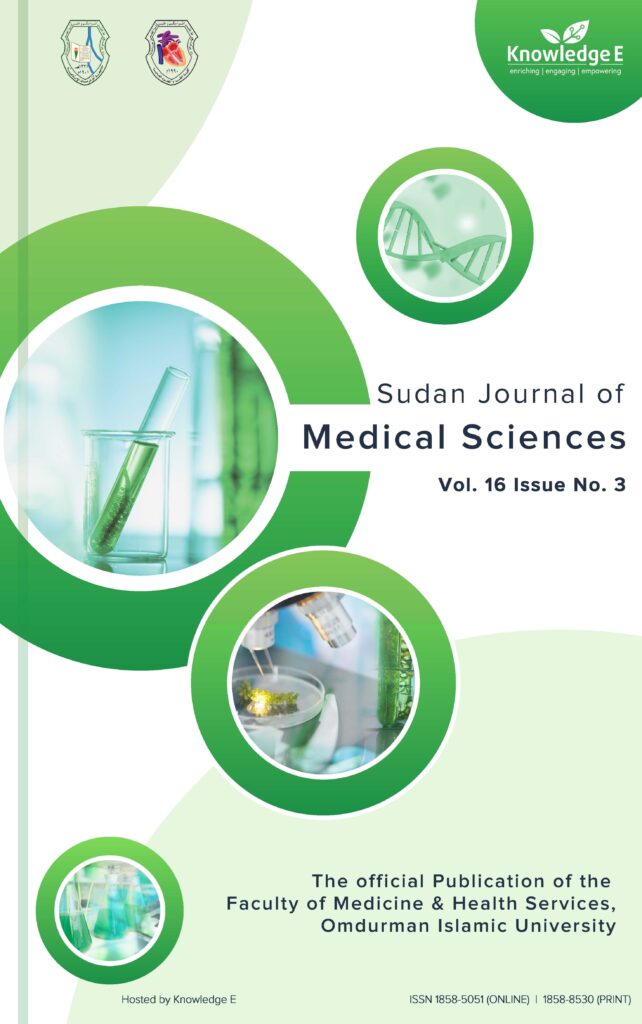
Sudan Journal of Medical Sciences
ISSN: 1858-5051
High-impact research on the latest developments in medicine and healthcare across MENA and Africa
Deranged liver among Sudanese Patients with Dengue Virus Infection in Port Sudan Teaching Hospital
Published date:Sep 06 2017
Journal Title: Sudan Journal of Medical Sciences
Issue title: Sudan JMS: Volume 12 (2017), Issue No. 3
Pages:187 - 197
Authors:
Abstract:
Background Deranged liver is a well-recognized feature of dengue infection, often demonstrated by coagulopathy and mild to moderate increase in transaminase levels although jaundice and fulminant hepatic failure are generally uncommon.
Objective This study aimed to evaluate the hepatic effect of dengue fever amongst Sudanese patients.
Materials and Methods A cross-sectional descriptive study recruited in Port Sudan teaching hospital in the period from February 2013 to June 2014. 334 cases of dengue along with 101 cases of control were enrolled. Rapid immune chromatographic test was used to confirm positive dengue cases and WHO criteria were used for classifying the dengue severity. Prothrombin time (PT), partial thromboplastin time (PTT), fibrinogen level (FB), platelet count (PLT), aspartate aminotransferase (AST), alanine aminotransferase (ALT) and C-reactive protein (CRP) were all measured.
Results PT, PTT, and FB were found to be significantly higher in the infected cohort when compared to the controls (P< 0.0001). PT was prolonged in 9%, PTT was prolonged in 12.6% and shortened by 5.4% of the patients, whereas hypofibrinogenemia in 18.3% and hyperfibrinogenemia in 67.4% of the patients. Bleeding was seen in 10.5% of patients and thrombocytopenia was detected in 83.5% of patients. Out of 334 patients, 101 (30.2%) had abnormal coagulation results. Of 101 patients, 72 were subjected mixing studies for PT and PTT that revealed deficiencies in factors VIII (35%), IX (10%), V (10%), X (19%), and XII (14%). 43.6% patients had elevated AST and 21.8% had elevated ALT.
ConclusionThis study demonstrated that hepatic dysfunction may be attributed to dengue virus infection which evident by prolongation in PT and PTT as well as hypofibrinogenemia and factor deficiencies.
References:
1. Guzman MG, Kouri G. Dengue: an update. Lancet Infect Dis.2002; 2 (1): 33– 2.
2. Laughlin CA, Morens DM, Cassetti MC, Costero-Saint Denis A, San Martin JL et al. Dengue research opportunities in the Americas. J Infect Dis. 2012; 206 (7): 1121- 27.
3. Malik A, Earhat K, Mohareb E, Saad M, Saeed M et al. Dengue hemorrhagic fever outbreak in children in Port Sudan. J Infect Public Health. 2011; 4 (1): 1 – 6.
4. Ali KA, Abu elgasim S. A correlation study between clinical manifestation of dengue fever and degree of liver injury. J Microbiol Antimicrob. 2012; 4 (2): 45 – 48.
5. Chuang YC, Lin YC, Liu HS, Wang JR, Yeh TM. Antibodies against thrombin in dengue patient contain both anti-thrombotic and pro-fibrinolytic activities. Thromb Haemost. 2013; 110 (2): 358 – 65.
6. Mustafa MS, Rasotgi V, Jain S, Gupta V. Discovery of fifth serotype of dengue virus (DENV-5): A new public health dilemma in dengue control. Med J Armed Forces India. 2015; 71 (1): 67 – 71.
7. Seneviratne SL, Malavige GN, de Silva HJ. Pathogenesis of Liver involvement during dengue viral infections. Trans R Soc Trop Med Hyg. 2007; 100: 608 – 14.
8. Lum LC, Lam SK, George R, Devi S. Fulminant hepatitis in dengue infection. Southeast Asian J Trop Med Public Health. 1993; 24: 467 – 71.
9. Chhina RS, Goyal O, Chhina DK, Goyal P, Kumar R, Puri S. Liver function tests in patients with dengue viral infection. Dengue Bull. 2008; 32: 110 – 7.
10. Goal A, et al. Dengue fever- A Dangerous Foe. JIACM, 2004; 5(3): 247 – 58.
11. Jagadishkumar K, Jain P, Manjunath VG, Umesh L. Hepatic Involvement in Dengue Fever in Children. Iran J Pediatr. 2012; 22(2): 1 – 6.
12. Trung DT, Thu Thao LT, Hien TT, et al. Liver involvement associated with dengue infection in adults in Vietnam. Am J Trop Med Hyg. 2010; 83(4):774-80.
13. Itha S, Kashyap R, Krishnani N, et al. Profile of liver involvement in dengue virus infection. Natl Med J India 2005;18(3):127-30.
14. Wang M, Shen E. The Utility of liver function tests in dengue. Ann Acad Med Singapore. 2008; 37: 82 – 3.
15. Shukla V, Chandra A. A study of Hepatic Dysfunction in Dengue. J Assoc Physicians India. 2013; 61 (7): 450 – 1.
16. Faridi MMA, Aggarwal A, Kumar M, Sarafrazul A. Clinical and biochemical profile of dengue haemorrhagic fever in children in Delhi. Trop Doct. 2008;38(1):28-30.
17. Petdachai W. Hepatic dysfunction in children with dengue shock syndrome. Dengue Bulletin. 2005;29: 112 - 7.
18. Seneviratne SL, Malavige GN, de Silva HJ. Pathogenesis of liver involvement during dengue viral infections. Trans R Soc Trop Med Hyg. 2006; 100(7):608-14.
19. Souza LJ, Alves JG, Nogueira RM, et al. Aminotransferase changes and acute hepatitis in patients with dengue fever: analysis of 1,585 cases. Braz J Infect Dis. 2004;8(2):156-63.
20. Wong M, Shen E. The Utility of liver function tests in Dengue. Ann Acad Med. 2008;37(1):82-3.
21. Karoli R, Fatima J, Siddiqi Z, Kazmi KI, Sultania AR. Clinical profile of dengue infection at a tertiary hospital in north India. J Infect Dev Ctries. 2012; 6 (7): 551 – 54.
22. Shiann TH, Wang SM, Lin YS, Liu CC. Clinical and Laboratory Predictive markers for acute dengue infection. J Biomed Sci. 2013; 20 (1): 75.
23. Juffrie M, Meer GM, Hack CE, Haasnoot K, Sutaryo, Veerman AJ, Thijs LG (2001). Inflammatory mediators in dengue virus infection in children: interleukin-6 and its relation to C-reactive protein and secretory phospholipase A2. Am J Trop Med Hyg. 2001; 65(1):70-5.
24. Kutsuna S, Hayakawa K, Kato Y, Fujiya Y, Mawatari M, Takeshita N, Kanagawa S, Ohmagari N. The Usefulness of Serum C-Reactive Protein and Total Bilirubin Levels for Distinguishing Between Dengue Fever and Malaria in Returned Travelers. Am J Trop. Med. Hyg. 2014; 90 (3): 444 – 8.